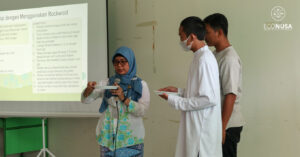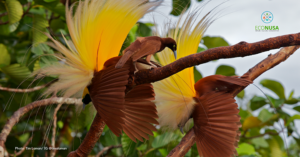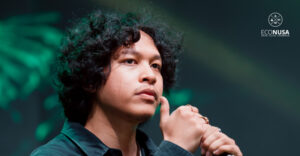
The EcoNusa Foundation with a mission of solidarity distributes agricultural equipment support to remote and coastal island communities in the Maluku region. Not only that, EcoNusa also provides agricultural counseling related to good farming methods. All villages visited by the Maluku EcoNusa Expedition Team received support from an agricultural package, including Nuruwe, Haruku, Ameth, Rhun, Hatta and Tanah Rata villages, Banda Neira District.
Many stories are intertwined in these villages. The agricultural extension was delivered in a relaxed atmosphere in the extension discussion room jokingly. Occasionally a game is played to trigger the extension participants to think about finding the answer. Agricultural extension takes place in an atmosphere of intimacy.
The people of Maluku have a variety of natural resource potentials that are abundant, both at sea and on land. The community response in the villages is also very good. On the other hand, even though they have limited information and means of transportation, they still live their daily lives normally. The community also tells about abundant production and vast land. Unfortunately, they are constrained by limited marketing, seeds, and agricultural capital.
Another obstacle, despite having fertile soil and a strong willingness to farm, seeds are difficult to find. In addition, the community’s knowledge of hatcheries is limited. Water supply also hampers agriculture because people still rely on rainwater. Seeing these constraints and limitations, the knowledge about pest control conveyed by the agricultural extension team is very useful as a provision to reduce the risk of plants being attacked by pests and diseases.
Citizen Farming
The support for packages and agricultural tools provided by the EcoNusa Foundation includes organic petrobio fertilizers, spinach seeds, kale, tomatoes, cayenne pepper, purple eggplant, string beans, and palm oil. Meanwhile, the agricultural equipment provided was a hoe, sprayer, and boots.

In Negeri Ameth, Nusa Laut District, Central Maluku Regency, residents appreciate the aid package and agricultural tools distributed by the EcoNusa Foundation, although previously there had also been assistance from the district government.
Eghy Holle, 52, admitted that the support from EcoNusa really helps the community in farming. Agricultural extension services were well received by the community.
This mother of three children hopes that the packages and agricultural tools will be distributed to those who are entitled to receive it. Because from previous experience, assistance was not on target. The reason is, there are various types of agriculture that residents are involved in. There are clove farmers, vegetable farmers who use the hydroponic method.
“Yes, I hope that the aid can be distributed right on target,” said Egy.
Agus Molle, 67, said that there used to be an agricultural group in Ameth Village. But now it’s not there anymore. Usually, the assistance that is channeled by the government is directly allocated to these farmer groups.
It turns out that the Ameth residents experience problems in farming because of their land ownership rights. This is because the lands in Nusa Laut are considered as dati (customary land) so that the land owned by residents is limited.
“So there are several heads of families who own one land and then they are busy farming there. On average, the people in Saparua, Nusalaut, and Haruku use dati land from the Netherlands. That’s why it’s very difficult to get funds or credit from a bank, “said Agus.
This is inversely proportional to residents in Pulau Ay Village who are rich in nutmeg and walnuts. This village, which is located west of the Banda Islands, is indeed abundant in natural resources. This village is also one of the best snorkeling spots in the Banda Sea. Naturally, the richness and natural beauty of these islands attracted European nations to come in the past.
According to the local community, the area of the walnut and nutmeg gardens there is based on the area of the village. At this time, they started to harvest nutmeg and walnuts. Dry nutmeg is sold for Rp. 80,000 per kilogram, while for interest it is Rp. 240,000. Walnuts are sold at IDR 50,000 per kilogram. Nutmeg is not only sold, but some are processed into essential oils, such as on Rhun Island. From this processing, residents get promising benefits.
Tika, 38, one of the walnut farmers said that since she was a child she has been picking walnuts in the garden. He admitted that every day he went to the forest to collect walnuts using traditional tools made of bamboo and iron.
The walnuts are then dried in the sun before peeling them to retrieve their contents. In a day, he can peel 5 kilograms of walnuts from the skin. Unfortunately, there are no companies that can accommodate the residents’ agricultural products.
Agriculture is a very good food storage in Maluku. However, on average, people in the villages visited face several main obstacles in their agricultural practices. Even though most people work as farmers.
In a separate location, Andre Laminggu Sondak, Secretary of Pulau Ay Village Conservation, said that to protect the commodities there, the Village Government issued sasi, both land and sea sasi.
For land sasi, residents caught taking one nutmeg will be subject to a penalty of Rp. 50,000. If the sasi violator cannot pay, he will be subject to whipping. “So there is a sasi like that. If someone is caught stealing nutmeg when the sasi has been implemented, then they will get sanctions, “said Andre.
In addition, the village government also applies a fee for incoming ships and tourists, both local and foreign who dive in their marine territory.
Editor: V. Arnila Wulandani & Leo Wahyudi







